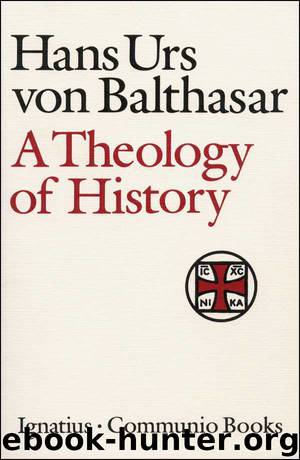A Theology of History (Communio Books) by Hans Urs von Balthasar

Author:Hans Urs von Balthasar [von Balthasar, Hans Urs]
Language: eng
Format: epub
Tags: Spiritual & Religion
ISBN: 9781681491257
Publisher: Ignatius Press
Published: 2017-01-11T16:00:00+00:00
The Sacraments
Having got as far as tins, we should not find any impenetrable obscurity in the second level of universalization, the sacramental level. We shall take as our first principle that Christ’s existence, and hence his mode of duration, in the Eucharist and the sacraments is, as far as concerns himself no different from that which belongs to the forty days. Here, again, he is the risen Lord, living in the eternity of the Father, his earthly time transfigured into his eternal duration, the eternal Christ accompanying “his own” throughout time. The new element of difference is only that whereas during the forty days he lets this companionship appear openly as fulfillment, in the time of the Church it happens in concealment under the sacramental forms. But the forty days were expressly intended as an introduction and initiation of the days of the Church.
Yet their interdependence and relationship are even closer than this. For whereas before his Passion the Lord let himself be seen physically by any and every man, and for this very reason was still veiled to spiritual sight, after the sealing of the tomb he is visible in principle only to believers; either those who already believe, like the apostles, or those whom he brings to belief by appearing to them, like Paul. The dimension within which it is possible for him to appear is the dimension of faith—for his appearance now always implies the revelation of divinity in his humanity. And this faith is something issuing from the Cross, an objective, unalterable fact of the “new and eternal covenant”, an expression of the truth that this covenant is, on both sides, no longer subject to the vagaries of human infidelity. It is a faith that lies beyond all the vacillations of the individual subjects who participate in it; faith as an enduring medium within which the risen Christ can be present without humiliation of the Passion; faith as that which is henceforward as steadfast as Revelation; faith as the trustworthy answer to Christ’s own word, necessarily guaranteed by the Redeemer himself; faith which cooperates in constituting dogma, and the Church’s teaching, and the Church herself as Bride. And it is in this medium, whose unfailing presence is assured by the Holy Spirit, that the Son can be present in the sacramental mode.
Moreover, in saying that, as far as concerns the Lord himself, the sacramental form of existence does not differ from that of the forty days, we imply that he appears therein as interpreting, revealing and bestowing his earthly life, and in that sense bringing it with him, representing it, making it present. In this sense one may speak of a “mystery-presence”; and the main focus of interest in “mystery theology” should perhaps be sought in the fact that Christ’s presence in the sacraments, his gracious approach to man in the sacramental act, is qualitatively determined by himself personally, and is rooted in his earthly life. It would go beyond the limits of this study to apply the concept thus sketched to the sacraments individually.
Download
This site does not store any files on its server. We only index and link to content provided by other sites. Please contact the content providers to delete copyright contents if any and email us, we'll remove relevant links or contents immediately.
The Lost Art of Listening by Michael P. Nichols(6475)
Why I Am Not A Calvinist by Dr. Peter S. Ruckman(3771)
The Rosicrucians by Christopher McIntosh(3051)
Wicca: a guide for the solitary practitioner by Scott Cunningham(2706)
Signature in the Cell: DNA and the Evidence for Intelligent Design by Stephen C. Meyer(2502)
Real Sex by Lauren F. Winner(2477)
The Holy Spirit by Billy Graham(2419)
To Light a Sacred Flame by Silver RavenWolf(2355)
The End of Faith by Sam Harris(2292)
The Gnostic Gospels by Pagels Elaine(2027)
Nine Parts of Desire by Geraldine Brooks(2008)
Waking Up by Sam Harris(1959)
Heavens on Earth by Michael Shermer(1955)
Devil, The by Almond Philip C(1901)
Jesus by Paul Johnson(1889)
The God delusion by Richard Dawkins(1850)
Kundalini by Gopi Krishna(1825)
Chosen by God by R. C. Sproul(1763)
The Nature of Consciousness by Rupert Spira(1690)
